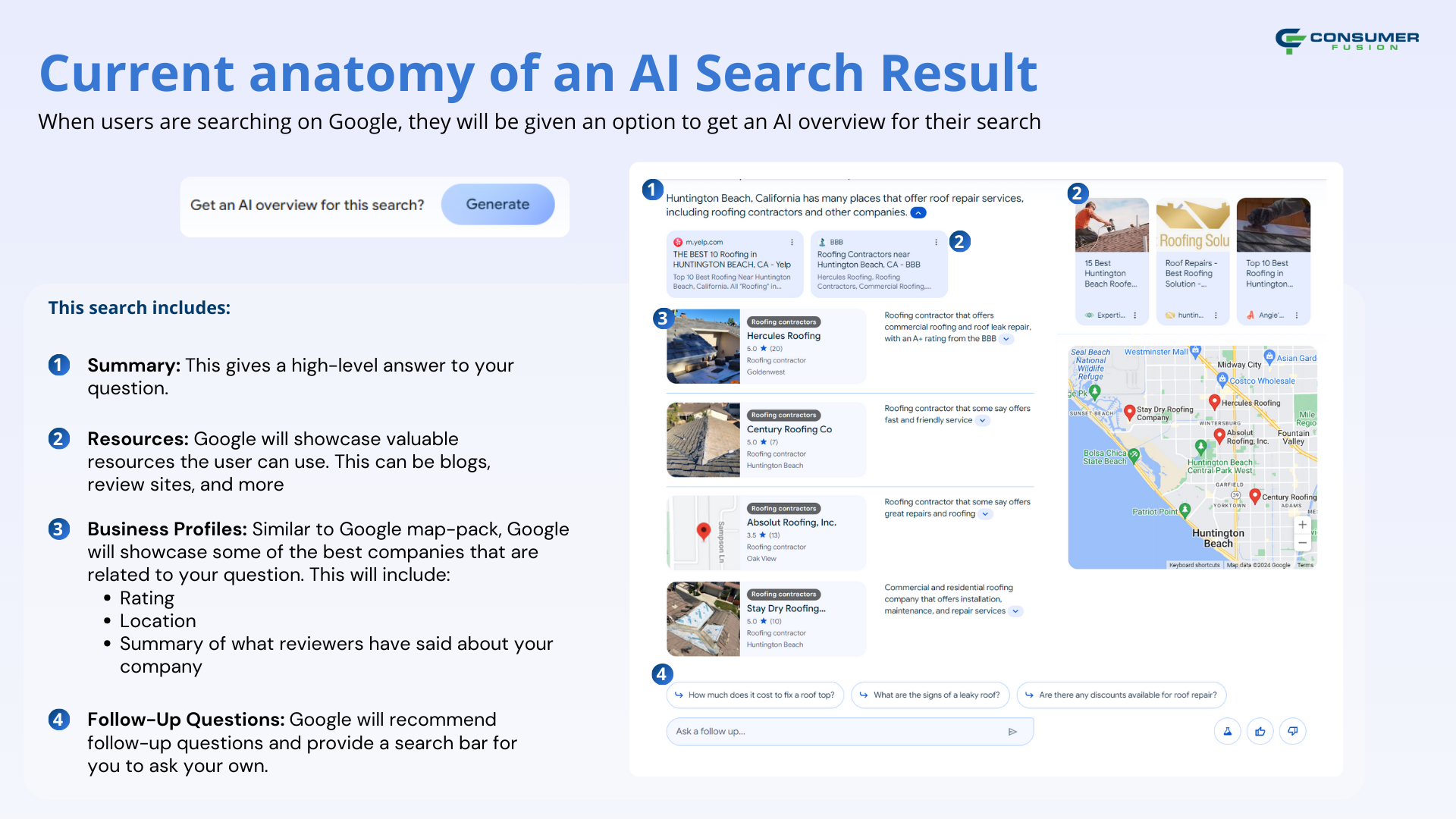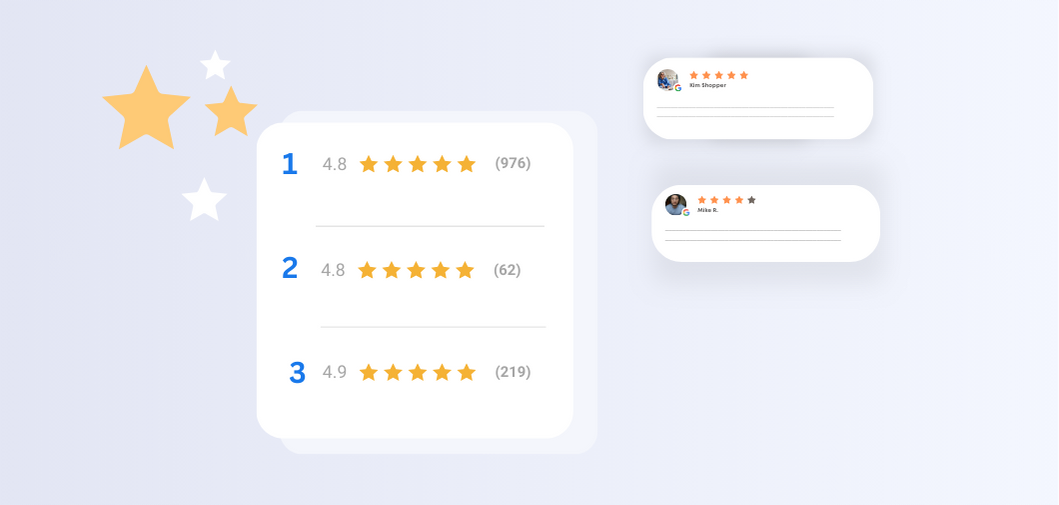Welcome to the era of Google’s new AI-powered search, where algorithms are smart, and search results are more personalized than ever before. If you are here, you probably have heard the buzzwords around Generative AI and the way it is going to change not just the way consumers search online but how search engines, specifically Google, will choose what information to display. As businesses start to understand Google Search AI, understanding how to rank high on Google’s AI search Will become essential for success. In this guide, we’ll provide you with a roadmap to elevate your brand’s visibility in Google ranking, and ensure Google AI search is showing your business when consumers search.
Table of Content
Understanding Google AI Search
Let’s start by decoding Google’s new AI-powered search. From advanced algorithms to personalized search experiences, we’ll delve into the key features and how they work.
Google’s Search Generative Experience (SGE)
Google is leveraging the power of Generative AI in their platform when consumers search. This is known as Google’s Search Generative Experience (SGE). This “is a feature that uses generative AI to help users understand topics faster, find new insights, and get things done more easily,” as defined by Google SGE.
Now that we know that Google AI search uses generative AI, let’s define what generative AI is. The difference between Generative AI and other AI is that Generative AI is capable of generating new content, images, and even entire worlds from scratch.
How does generative AI work?
Gone are the days of mindlessly stuffing keywords into your website content and praying for a spot on the first page of Google. Rather than relying solely on keyword matching, Google prioritizes and understands the context of a search. This means they try to figure out not just what you’re looking for, but also why you’re looking for it.
This shift is a game-changer for how websites get ranked on Google. It means you can’t just stuff your website with lots of keywords anymore and hope to get to the top of the search results. Now, you need to create content that actually helps people and matches what they’re looking for.
Take, for example, voice search. Thanks to advancements in generative AI, voice assistants like Siri and Alexa can understand natural language queries, deciphering your tone, intent, and even your accent to deliver precise and relevant results. It’s like having a conversation with your computer, minus the awkward small talk.
What does a Google AI search look like?
When users are searching on Google, they will be given an option to get an AI overview for their search:

When you click on “Generate” this is what the anatomy of your search will look like:
1. Summary: This gives a high-level answer to your question.
2. Resources: Google will showcase valuable resources the user can use. This can be blogs, review sites, and more.
3. Business Profiles: Similar to Google map-pack, Google will showcase some of the best companies that are related to your question.
• This will include:
• Rating, location, and Summary of what reviewers have said about your company
4. Follow-Up Questions: Google will recommend follow-up questions and provide a search bar for you to ask your own.
5. Map of locations
How will potential clients use Google AI Search?

Now that Google is using generative AI in their search, we start to see a shift in the way consumers search. Users will start to prefer more specific search queries. Instead of searching “Best roofing company near me,” they will search something like “Cost for roof repair service.”
Imagine this: you’re searching for something online, and instead of sifting through endless listings and reviews, Google serves up results tailored exactly to what you’re looking for.
Google doesn’t just passively respond to search queries. Instead, it actively generates search results that are finely tuned to match the user’s intent and context. By taking into account factors like the user’s search history, location, and preferences, Google ensures that each search experience is efficient and tailored to the individual.
-
-
-
- Ask new kinds of questions that are more complex and more descriptive.
- Get the gist of a topic faster, with links to relevant results users can explore further.
- Get started on something you need to do quickly, like writing drafts or generating imagery right from where you’re searching.
- Make progress easily by asking for conversational follow-ups or trying to suggest next steps.
-
-
How to make sure your business ranks on Google AI search
The Importance of Reputation Management in an AI-Driven World
Think of your online reputation as your digital handshake. It’s what people see first when they Google you. Positive vibes? Great! Negative vibes? Not so much. Managing your reputation means making sure that the digital handshake is firm and friendly, earning trust and credibility with every click.
1. Consumer reviews will be the foundation of Google AI search
Why: In Google’s Generative AI search results, a business’s rating and the quantity of reviews it has garnered are prominently featured. Additionally, search results provide a summary of the overall sentiment conveyed by these reviews. Moreover, when a search query includes specific terms such as “price,” “health,” or “quality of service,” Google prioritizes businesses that have received reviews related to these keywords. This ensures that users receive tailored results that align with their specific interests and requirements. Furthermore, Google ranks businesses based on the quality of their reviews, the overall rating they have received, and how closely they match the intent behind the search query. This ensures that businesses offering high-quality products or services and garnering positive feedback are rewarded with enhanced visibility in search results.
Tip: A valuable tip for businesses aiming to leverage Google’s Generative AI search is to actively encourage satisfied customers to leave detailed and positive reviews. By prompting customers to share their experiences, businesses can boost their ratings, increase the volume of reviews, and improve their overall visibility in search results. Additionally, businesses should focus on addressing any negative feedback promptly and constructively, demonstrating a commitment to customer satisfaction and enhancing their reputation in the eyes of both consumers and search algorithms.
Ex: “Hi there! I recently had a fantastic experience at [Business Name]. The staff was incredibly friendly and helpful, and the service I received was top-notch. I particularly appreciated [specific aspect of the service, e.g., the attention to detail, the quick response time, etc.]. Overall, I would highly recommend [Business Name] to anyone in need of [product/service provided]. Keep up the great work!”
2. Directories will still be relevant and impact what Google shows consumers when they search
Why: In the ever-evolving landscape of Google’s Generative AI search, directories continue to be important and have a significant influence on the information presented to consumers in Google AI search. Despite the advancements in Google’s AI search, directories continue to serve as reservoirs of valuable information, offering users access to a diverse array of resources aligned with their search queries.
Google’s emphasis on presenting users with resources that are not only accessible but also relevant to their search queries underscores the enduring significance of directories. These platforms serve as repositories of knowledge, housing a wealth of information that users may find instrumental in addressing their inquiries and meeting their needs.
Furthermore, Google’s Generative AI algorithms leverage data from third-party directories to enrich their search results, ensuring users receive comprehensive and authoritative information. By tapping into the extensive pool of data available in directories, Google enhances the relevance and utility of its search results, thereby enhancing the overall search experience for users. Therefore, businesses should prioritize maintaining accurate and up-to-date listings in directories to ensure visibility and relevance in Google’s AI-driven search landscape.
Tip: A valuable tip for businesses aiming to optimize their visibility is to ensure their presence in relevant directories is accurate and up-to-date. This involves regularly monitoring and updating business listings across various directories, ensuring that information such as business name, address, phone number, and website URL is consistent and accurate.
Businesses should focus on obtaining positive reviews and ratings on these directories, as Google’s AI algorithms consider the quality and quantity of reviews when determining search rankings. Encouraging satisfied customers to leave detailed and positive reviews can significantly enhance a business’s credibility and visibility in search results.
3. Create useful and concise content to demonstrate your expertise
Aligning with User Intent: Google’s Generative AI algorithms prioritize content that directly addresses the questions and queries users are searching for. This means that businesses need to create content that resonates with their target audience’s needs and interests. By understanding the intent behind users’ searches, businesses can tailor their content to provide valuable solutions, answers, or insights. Whether it’s addressing common questions, offering solutions to problems, or sharing expert knowledge, the content should serve to fulfill the needs of the audience.
Optimizing for Conversational Search: With the increasing prevalence of conversational search, it’s crucial for businesses to create content that is concise and natural-sounding. Google’s Generative AI algorithms excel at understanding conversational queries and delivering relevant results that match the user’s intent. By crafting content in a conversational tone and format, businesses can enhance their chances of appearing in voice searches and natural language queries. This not only improves visibility but also drives more organic traffic to the website.
Conclusion
In conclusion, embracing the transformative power of Google’s new AI-powered search is not just a strategic move; it’s a proactive step towards future-proofing your business. By staying ahead of the curve and mastering the intricacies of Google AI search, businesses can position themselves as leaders in their respective industries. It’s about more than just ranking high on search results; it’s about delivering personalized, relevant, and valuable experiences to users. Whether it’s through reputation management, content optimization, or embracing conversational search trends, every effort made today paves the way for success tomorrow.
If you’re ready to take your business to the next level and harness the power of Google AI search, look no further than Consumer Fusion. With all the tools you need to get in front of customers, increase ROI, and boost your online reputation, our comprehensive strategy, cutting-edge technology, and dedicated team are here to support your business goals. Let us take reputation management off your plate so you can focus on what you do best – growing your business. Schedule a consultation with us today and discover how Consumer Fusion can elevate your online presence and drive tangible results.
Other Favorites

How Reviews Impact Local Search
Step into the realm of local search, where the digital landscape shapes the success of your business. In this engaging and informative guide, we'll...

Local SEO Strategy 2025: Your Guide to Dominating the Local Scene
Table of Content AI and Local SEO Conversational SEO: Talk to Your Customers Online Reviews and Online Reputation: Building Trust and Credibility...

Why Local Reputation Management Matters for Your Business
Local reputation management is crucial for businesses of all sizes. It involves monitoring and influencing the perception of your brand within your...
Simplify Your Reputation Management
Learn why so many brands trust us for Reputation Management


















